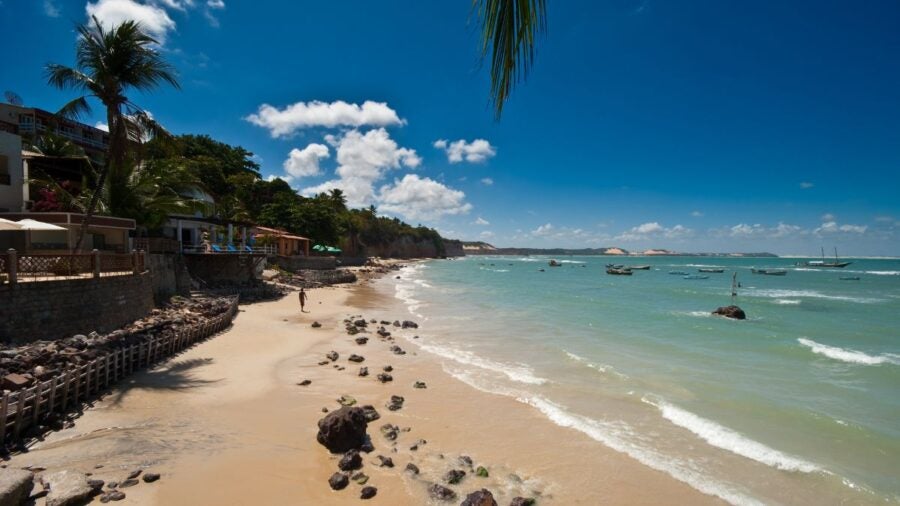
Brazil is a unique mix of natural wonders, great food, vibrant culture and a dynamic economy. It has started to offer visas for the growing army of digital nomads and with warm people and even warmer weather, Brazil offers plenty of opportunities for international professionals.
What to know before you move to Brazil
Brazil is famous for its nature, football and parties but as a large and complex country, it offers many kinds of different experiences for visitors. Most expatriates will likely move to one of its large urban areas – and there is no shortage to choose from. According to the official Brazilian statistics bureau (IBGE), 17 cities in 2021 had more than 1 million inhabitants.
The megacities of Rio de Janeiro (6.7 million inhabitants), São Paulo (12.3 million) and Belo Horizonte (2.7 million) all have large business districts, where luxury accommodation and world-class gastronomic experiences are easy to find. But these cities also have poverty, wide social inequality and, in some neighbourhoods, violence and crime, so choosing a safe place to live is paramount.
If you are moving with your family, it is important to research private schools and health services. Europeans, in particular, should bear in mind that public services in Brazil are not likely to be up to the standards they are used to in their home countries.
Language is a point to consider, too. Brazilians speak Portuguese, which resembles Spanish. Because of the similarities between the languages many Brazilians wrongly believe that they can speak Spanish. Most people, however, are solidly monoglot. In São Paulo and Rio de Janeiro, English might be spoken in large companies and in luxury shops but in supermarkets and most stores people are most likely to exclusively speak the local language. It can be a jarring experience to rely on English being spoken at register offices, notaries, the police and other public entities central to Brazilian life.
Brazil has a modernised financial system and a dynamic digital environment that together are gradually making life easier for companies. WhatsApp is an important business tool for Brazilians, who use it to make purchases, make sales and transfer money. For those who are paid in dollars or euros, Brazil will seem quite inexpensive. According to Expatistan, the cost of living in Rio de Janeiro is 59% lower than in London and 66% lower than in New York, while prices are even more affordable outside Rio and São Paulo.

Newcomers can enjoy Brazil’s rich gastronomy, which ranges from feijoada (black bean stew) in Rio de Janeiro and some of the best pizzas this side of Naples in São Paulo, to churrasco grills in the South and all kinds of affordable seafood in the North East.
How to apply for a visa
Foreigners who move to Brazil to work will require a visa and getting one tends to be a complex and lengthy process. But recently Brazil implemented rules that create an easier path for international digital nomads. Newspaper Folha de S.Paulo has estimated that an average of one visa a day has been issued to digital nomads since the scheme began in January 2022.
The new visa is aimed at digital nomad workers who want to spend more than three months in Brazil. It is valid for up to one year and can be extended by a further 12 months. It gives the visa holder the same rights as Brazilians, which includes access to public services such as the national health service, although it is highly advisable to take out private health insurance before moving to the country.
To meet the visa’s requirements, workers must show proof of income of at least the equivalent of around £1,200 a month or £1,450 in savings. Diana Quintas, a partner at consultancy Fragomen in São Paulo, claims that the amount compares favourably to the requirements for other countries. Additionally, all the income earned by nomad workers must be paid by companies based outside Brazil. Remember that workers who stay in Brazil for up to six months are exempt from paying income tax in the country, but the Brazilian authorities will tax the global income of workers who live in the country for more than half a year.
People can apply for these visas in Brazilian consulates in their home country, or via a website maintained by the Brazilian government. The intention is to make the process a smooth one but experts say it is still a work in progress. The government’s website does include guidance in English and Spanish but it isn’t easy to find and some parts of the website are still in Portuguese.
Anyone who falls in love with Brazil while on holiday and decides to apply for a visa can do so through an office of the Brazilian federal police. In which case, they should seek expert help unless they speak Portuguese and have lots of time (and patience).
“There is so much red tape that it isn’t viable for digital nomads to do it themselves,” Quintas says. “If someone is planning to stay up to three months in Brazil, it is more advantageous to come as a tourist.”
The best places to live in Brazil for expats
The government of the Rio de Janeiro state has designed a programme to help digital nomads in the hope that help with accommodation and co-working spaces will convince many people to spend a season in the city. Rio offers adventurous expats an array of activities to keep them busy, from beautiful beaches, brilliant music and exquisite food to a vibrant nightlife and the annual carnival. There is also a higher probability of finding English-speaking staff at stores and restaurants in a city that is a tourism hotspot.
But security is a real issue in Rio, the cost of living is high for Brazilian standards, public transport can be challenging and traffic is famously hellish.
São Paulo, the economic capital of Brazil, is smaller and cheaper, meanwhile coastal cities like Florianópolis (population 508,000), in the South, and João Pessoa (817,000) in the North East, are also making efforts to attract digital workers. Brazil is a large country and international trips from outside the main airport hubs of São Paulo and Rio de Janeiro can feel like an odyssey.

If you prefer to spend time close to beaches that look like true paradise, head for one of the many villages in the North East, close to main cities such as Salvador, Recife and Fortaleza. Many of them have posadas (hostels) that cater for discerning European visitors, such as Trancoso, Porto de Galinhas and Jericoacoara.
Pipa is a 90-minute drive from Natal airport and where Portuguese company NomadX is creating a community for digital nomads. With a beautiful beach and good weather the whole year round, some have compared the location to Bali “but with fewer people and a better time zone”, says Gonçalo Hall, who is head of the project. Pipa has a surprisingly strong digital infrastructure and an affordable cost of living. According to Hall, a salary of between £1,000 and £1,500 a month is more than sufficient to live well there.
Tackling Brazil’s image problem
The political polarisation in the country led to an attempted coup at the start of the year when Jair Bolsonaro supporters tried to storm Brazil’s Congress building. The rise in deforestation of the Amazon rainforest under the former president’s term also created consternation in the international community.
Lawyer Gabriela Voss Chagas says these events have contributed to an image problem for Brazil, which will take time to restore the positive perception the country once had among the international community. Capitalising on the popularity of digital nomadism is one way to do this, thinks Chagas. “Brazil is a fantastic country and a diverse one,” she says. “We just need to make people see that.“
You can read more from our Working Around the World series here.

Brazil is a unique mix of natural wonders, great food, vibrant culture and a dynamic economy. It has started to offer visas for the growing army of digital nomads and with warm people and even warmer weather, Brazil offers plenty of opportunities for international professionals.
What to know before you move to Brazil
Brazil is famous for its nature, football and parties but as a large and complex country, it offers many kinds of different experiences for visitors. Most expatriates will likely move to one of its large urban areas – and there is no shortage to choose from. According to the official Brazilian statistics bureau (IBGE), 17 cities in 2021 had more than 1 million inhabitants.

